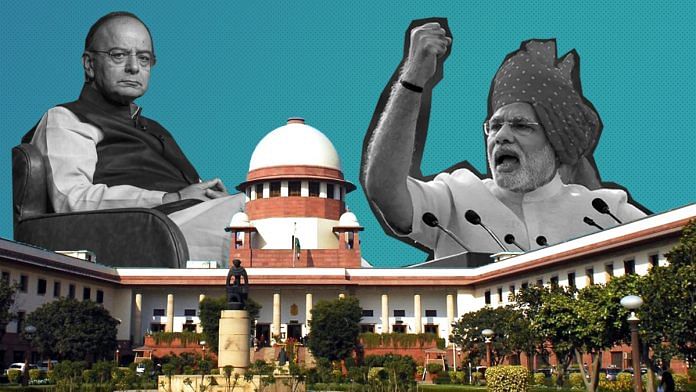In a veiled reference to the protests over the Supreme Court ruling on Sabarimala temple and the developments in the CBI, finance minister Arun Jaitley stated that non-accountability of institutions could either be grounds for investigative adventurism and masking corruption, or just inaction.
ThePrint asks– Bigger hurdle for Indian democracy: Unchecked institutions like courts or autocrat leaders?
Institutions ‘over-reach’ when persons in charge of them act outside their powers
 Alok Prasanna Kumar
Alok Prasanna Kumar
Senior Resident Fellow, Vidhi Centre for Legal Policy
An institution ‘over-reaches’ when the persons in charge of the institution decide to act outside their powers as defined by the rules for that institution. Such acts are usually checked in one way or another – either the institution self-corrects or other institutions step in. The damage, such as it is, to the democratic fabric, can be limited.
It is not always obvious when an institution is ‘over-reaching’ and the fact that there is vigorous debate over such matters as the powers of the Central Information Commission, the Election Commission, the higher judiciary, et al, suggests that what we are really talking about is the scope of the boundaries themselves and not obvious cases of ‘over-reach’. Undoubtedly, there are instances of over-reach: The Supreme Court trying to force the national anthem down the throats of movie-goers or the Election Commission trying to regulate free speech in the name of elections. But these are relatively easy to check and the limited damage, rectifiable.
Authoritarian leaders mount an assault on the very idea of institutions themselves. They dismiss the idea that institutions should work according to rules and reason — everything, according to them, should be replaced by the will of the ‘leader’. An authoritarian leader uses the very institutions of democracy to seize power and then build a moat around themselves but bring down the institutions which might enable others to challenge such a leader.
Such leaders have no tolerance for debate or discussion (while they may pretend otherwise in polite company), and consider all issues from the point of view of whether it allows them to retain or lose absolute power. In India, we have seen the damaging effects of such authoritarian leaders at every level: Central, state and municipal. That the repeated terrible experience of placing our collective faith in such autocrats suggest that we are either incapable of learning, or as Ambedkar feared, we have simply not resolved the contradiction between a democratic polity and an undemocratic society.
The courts’ adjudication in governance matters are bound to create social costs
 Karan Bhasin
Karan Bhasin
Consultant Economist, Gyan Institute
It has been the case in India that post-Emergency, we’ve feared that our democratic institutions are fragile and have often looked towards the court to protect our interests. However, this has led to a frequent scenario of judicial overreach.
The problem with such an understanding stems from the fact that judges are not directly accountable to the people. In Indian democracy, we don’t have the preferences of population represented in the decisions taken by the court. This is in stark contrast with decisions taken by the executive or the legislative – both of which face elections and are directly held accountable from time to time.
Let us take the example of Sabarimala where the courts decided to allow women of a certain age group to enter the temple on a petition of a non-devotee (thus, she had no locus standi in the case). The judgment clearly didn’t represent the will of the society, which is why there is such a massive unrest in the state of Kerala. This demonstrates how judicial intervention cannot resolve matters related to religion, governance or traditions.
The courts’ adjudication in governance matters is bound to create social costs. With strong institutions and systemic checks on the executive by the legislative (which is directly answerable to the people), the possibility of an autocratic leader reduces significantly. As a result of this, the need of the hour is to strengthen our legislative institutions rather than look to judicial intervention to find solutions.
Whenever politicians pit the nation against an institution, alarm bells should ring
 Vineeth Krishna
Vineeth Krishna
Lead associate editor, Centre for law and policy research
There are institutions in this country, including constitutional bodies, that are marinating in inefficiency, corruption and unaccountability. However, the damage that these can inflict on Indian democracy pale in front of autocracy. Autocrats, overtly or otherwise, call into question the very idea and utility of institutions.
I get nervous when this government, which has demonstrated complete disregard for institutions ever since it came into power, speaks the language of institutional reform. The government’s distinct autocratic streak is evident in a number of examples that include demonetisation where India’s critical financial institution – the Reserve Bank of India – was not taken onboard.
Autocrats wait and watch for moments of institutional weakness – like the current CBI controversy – as an opportunity to widen their powers and make inroads into the institution’s independence under the garb of institutional reform, all the while claiming that their actions are taken on behalf of the ‘people’ and the ‘nation’.
The CBI’s institutional crisis, which many suggest was the result of politicisation by the government in the first place, has caused Arun Jaitley to think about institutions using their “unaccountability” to “mask corruption” and to argue that the “the country is taller than any institution”.
Whenever politicians pit the nation or the people against an institution, alarm bells should ring; there is a high chance that the autocrat has the institution in crosshairs and is about to sweep down and make a pass.
While unchecked institutions can pose a hurdle for constitutional democracy in India, autocrats with their ability to subvert the entire institutional landscape are far more dangerous.
Institutional aggregation of power is a far greater challenge for democracy than political leaders
 Sangit Ragi
Sangit Ragi
Professor, Delhi University
Constitutional democracy stands for limited government, which implies that institutions of government function within their defined jurisdictions. If any of them exceed their constitutional boundary and enter unchartered domains, there is a threat to constitutional equilibrium and democratic functioning.
Leaders are bound to be driven by the popular sentiments of people because their political existence thrives on popular mandate. But they can be easily restrained.
Democracy has its own mechanism to respond to and curb the wings of the autocrat leaders but what about the institutions, which appropriate and arrogate to themselves power that is not vested with them. In fact, the institutional aggregation of power coupled with arrogance and their arbitrary use, are far greater challenges for democracy than the political leaders. People can hit the streets if they find that their leaders have become autocrat but the same cannot be applied to constitutional institutions including courts, which are fast losing their respectability and credibility.
There is a growing realisation that courts and other institutions, which are supposed to protect the rights of the people, are not beyond the political divide.
People use the term ‘honorable court’ not because they really mean it but they fear that anything contrary to the voice of the court will invite punishment. Democracy cannot be measured from the lens of binary between courts and autocrat leaders. The way individuals have the tendency to appropriate and aggrandise power, institutions also may have such propensity. The greatest challenge to democracy is the restoration of people faith in the institutions, which have been made responsible to protect our rights and impart justice to all. The court needs to be seen doing justice, not taking decisions.
All non-Congress parties can team up to insulate our courts and institutions
 Arun Anand
Arun Anand
Author, Know About RSS
Ever since its inception, Indian democracy has faced this hurdle. Recent history shows that ‘authoritarianism’ amongst political class is the legacy of the Nehru era. Towering leaders like B.R. Ambedkar and Syama Prasad Mookerjee had to leave Congress due to ‘autocratic’ Nehru. The streak further strengthened in the Indira Gandhi era when India witnessed systemic subjugation of all key institutions. It culminated in the Emergency in 1975, but the trend continued in the 1980s with Congress regaining power.
During the 19 months of Emergency, even the judiciary buckled under pressure. The Constitution was amended and a purge was carried out against all those who were not ready to submit to the wishes of the ruling class.
This caused irreparable damage and we are still witnessing its after effects. While Nehru legitimised ‘authoritarianism’, daughter Indira demonstrated how to manipulate institutions to serve interests of the rulers. She strengthened the ‘autocratic’ leader legacy of her father.
Autocratic leaders are bad for the country, but courts trying to run the country are worse
 Maneesh Chhibber
Maneesh Chhibber
Editor, Investigations and special initiatives, ThePrint
The Constitution makers were very clear that the three pillars of democracy – legislature, judiciary and executive — should work separately but also in tandem, with a healthy respect for each other.
While a healthy tension among the three wings is expected, even to be welcomed, the problem needs fixing when the tension assumes gigantic proportions.
In the last few years that is what we have been witnessing. A proactive judiciary has repeatedly been trying to intrude into areas that are not its domain. While judicial activism has certainly done some good for the country, too much activism is now hurting and creating bad-blood.
Finance minister Arun Jaitley is right when he warns that democracy can’t be a tyranny of the unelected.
If the government doesn’t construct a village road or a school or a hospital in an area, the people will punish their elected representatives in the next elections. But, by trying to usurp the powers and duties of these elected representatives, the courts send out a clear signal to the public that they are good for nothing.
When courts talk of reforms, including legislative reforms, they forget that the task of reforming themselves is also awaiting their attention. Despite criticism, Indian judiciary itself continues to remain among the most opaque institutions in the country.
When former Prime Minister Indira Gandhi turned autocratic during the Emergency and disrespected institutions, the voters taught her a lesson in the next elections. What do we do with judges who sometimes do the same? Not even a single high court judge has been impeached till date.
While our jails continue to be full of undertrials awaiting their turn in some court, our courts, guardians of our civil rights, seem to be busy with other issues.
Autocratic leaders are bad for the country. But courts trying to run the country are worse.
By Fatima Khan, journalist at ThePrint. You can follow her on twitter @khanthefatima.![]()




Chandran Peechulli
20 mins
Supremacy of Constitution and Rule of Law SHOULD never undermine the respect of any SACRED AND NOBLE Institution OR EVEN ANY INDIVIDUAL CITIZEN OF INDIA. AFTER SEVEN LONG DECADES OF INDIAN INDEPENDENCE. WHY THIS BASIC UNFAIR TREATMENT OF DEPRIVAL TO EX-SERVICEMAN WHO JOINED THE INDIAN ARMY IN THE EARLY AGES OF LESS THAN FIFTEEN MORE PARTICULARLY IN THE NATIONAL EMERGENCIES I.E. CHINA AND PAKISTAN WARS 1962,1965 respectively .BESIDES WHOSE FATHER ALSO AN EX-SERVICEMAN OF WORLD WAR 2.
SHAME TO THE STATE AND NATIONAL GOVERNANCE. REGRET FOR NOT HAVING MIGRATED TO A COUNTRY OVERSEAS than serving in an ungrateful country, that cannot recognize the patriotic citizens.
Dr. Chandran Peechulli PhD; FIE (India),C.Eng;M.Tech., LLB; LLM; Research Scholar in PhD(Law)
Ex.Boy OC Corps of Signals, Jabalpur, Madhya Pradesh.